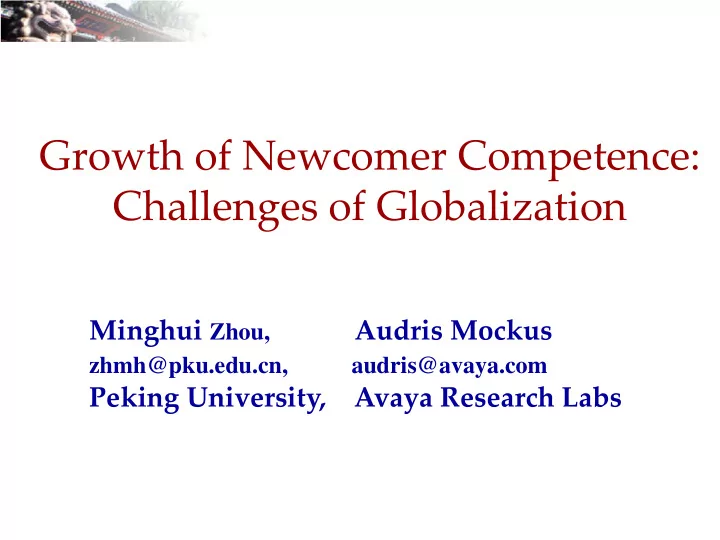

Growth of Newcomer Competence: Challenges of Globalization Minghui Zhou, Audris Mockus zhmh@pku.edu.cn, audris@avaya.com Peking University, Avaya Research Labs
History: Developer’s competence Issues and opportunities coexist today Claim the methodology Claim the issue Developer competence Empirical study was initiated issues become critical Hire the best person “By using …source code change Cognitive science: the behavioral history and problem reports we aspects of software engineering, quantify aspects of developer in particular, individual participation, ...” differences : 23-28:1 Census of public source code - Curtis Barriers history: “Until the many sources of variation Some fundamental questions can be among individuals have been answered only by considering the compared in the same set of data, it entire universe of publicly available will not be possible to determine precisely … the most important source code and its history predictor of success in training programs or on the job” - Curtis Time 1950’s 2010 1984 2000
Growth of Newcomer Competence: Challenges of Globalization Traditional organization Offshoring/outsourcing • “All (outsourcing) teams have similar experience levels, and all have had an influx of graduates and are struggling to get them up to speed“ -Outsourcing manager • How to speed up the project newcomers? Massive retirement of core developers in mature legacy products • ``Original developers probably understood how features would …, but subsequent are not necessarily aware of the whole context.” - Top developer • How should the newcomers learn about the product? Open Source Software (OSS) The explosion of OSS development, e.g, the cooperation between PKUAS and JOnAS: Numerous issues had to be recognized and addressed, including culture, language, time-zone, and, accessibility to the knowledge about the code and the development practices. How individuals and companies should learn to participate in the OSS projects?
Understand and improve developers’ project competencies Environment: Culture and Communication “ (In India) we expect a high level of attrition, so ownership has to be distributed among developers, which is not something we would do in the UK.” – Outsourcing manager Master’s road: The learning of experts “Individual differences among project personnel accounts for the largest source of variation in project performance” Bohem, 81 The project practice trajectories that experts take, how learners develop coherent structures of information, the motivation How to help: tools supporting project learning
How the project environment when a developer joins affects her future? Probability of becoming a long-term contributor (LTC) Middle Low High Probability that a joiner will become an LTC for different initial social climates
Understand and improve developers’ project competencies Environment: Culture and Communication “ (In India) we expect a high level of attrition, so ownership has to be distributed among developers, which is not something we would do in the UK.” – Outsourcing manager Master’s road: The learning of experts “Individual differences among project personnel accounts for the largest source of variation in project performance” The project practice trajectories that experts take, how learners develop coherent structures of information, the motivation How to help: tools supporting project learning
Reference B. Curtis. Fifteen years of psychology in software engineering: Individual differences & cognitive science. In ICSE’84, pages 97–106, 1984. B. Boehm. Software Engineering Economics. Prentice-Hall, 1981 A. Mockus, R. T. Fielding, and J. Herbsleb, A Case Study of Open Source Development: The Apache Server, 22nd International Conference on Software Engineering, pp. 263-272, Limerick, Ireland, June 4-1, 2000. C. de Souza, J. Froehlich, and P. Dourish. Seeking the source: software source code as a social and technical artifact. In GROUP ’05, pages 197–206, NY, USA, 2005. ACM. M. Cataldo, P. Wagstrom, J. Herbsleb, and K. Carley. Identification of coordination requirements: Implications for the design of collaboration and awareness tools. In CSCW’06, Banff, Alberta, Canada, 2006. A. Begel and B. Simon. Novice software developers, all over again. In International Computing Education Research Workshop, Sydney, Australia., 2008. A. Mockus. Amassing and indexing a large sample of version control systems: towards the census of public source code history. In 6th IEEE Working Conference on Mining Software Repositories, May 16–17 2009. G. Fischer. Cultures of participation and social computing: Rethinking and reinventing learning and education. IEEE International Conference on Advanced Learning Technologies, 0:1–5, 2009. K. Nakakoji, Y. Ye, and Y. Yamamoto. Comparison of coordination communication and expertise communication in software development: Motives, characteristics, and needs. In Proceedings of JSAI-isAI2009 Workshop on KCSD2009, pages 112–122. Springer Verlag, 2009. T. Fritz, J. Ou, G. C. Murphy, and E. Murphy-Hill. A degree-of-knowledge model to capture source code familiarity. In ICSE ’10, pages 385–394, New York, NY, USA, 2010. ACM. M. Zhou and A. Mockus. Developer fluency: Achieving true mastery in software projects. In ACM SIGSOFT / FSE, Santa Fe, New Mexico, 2010.
Recommend
More recommend